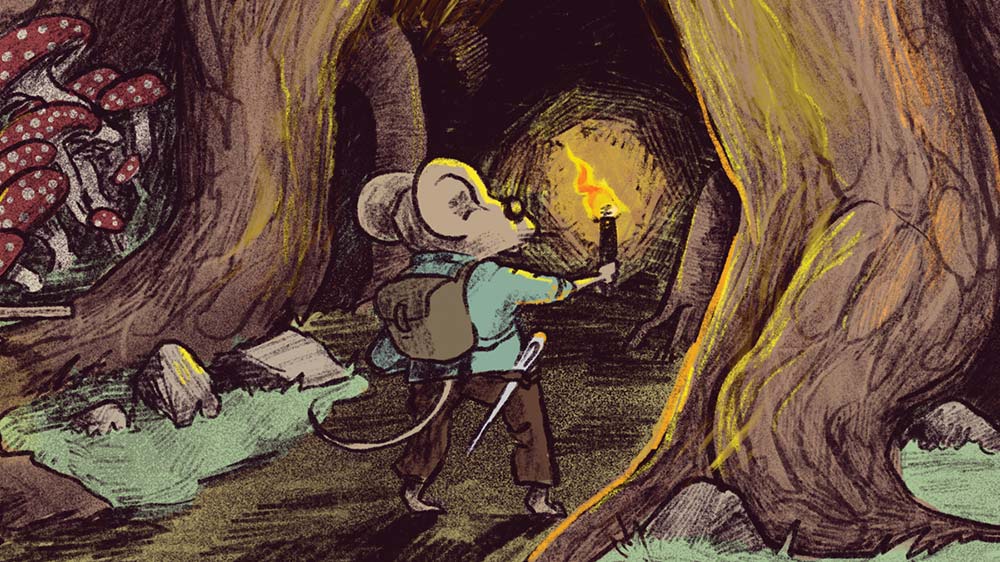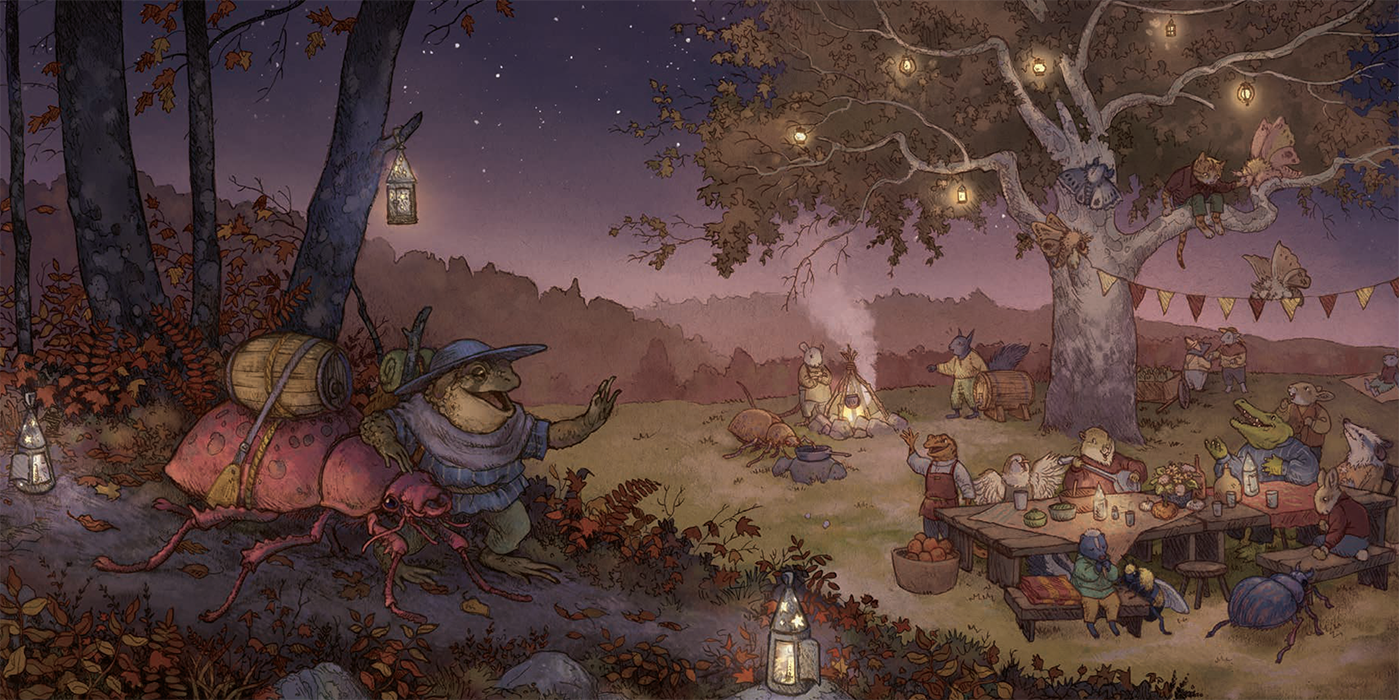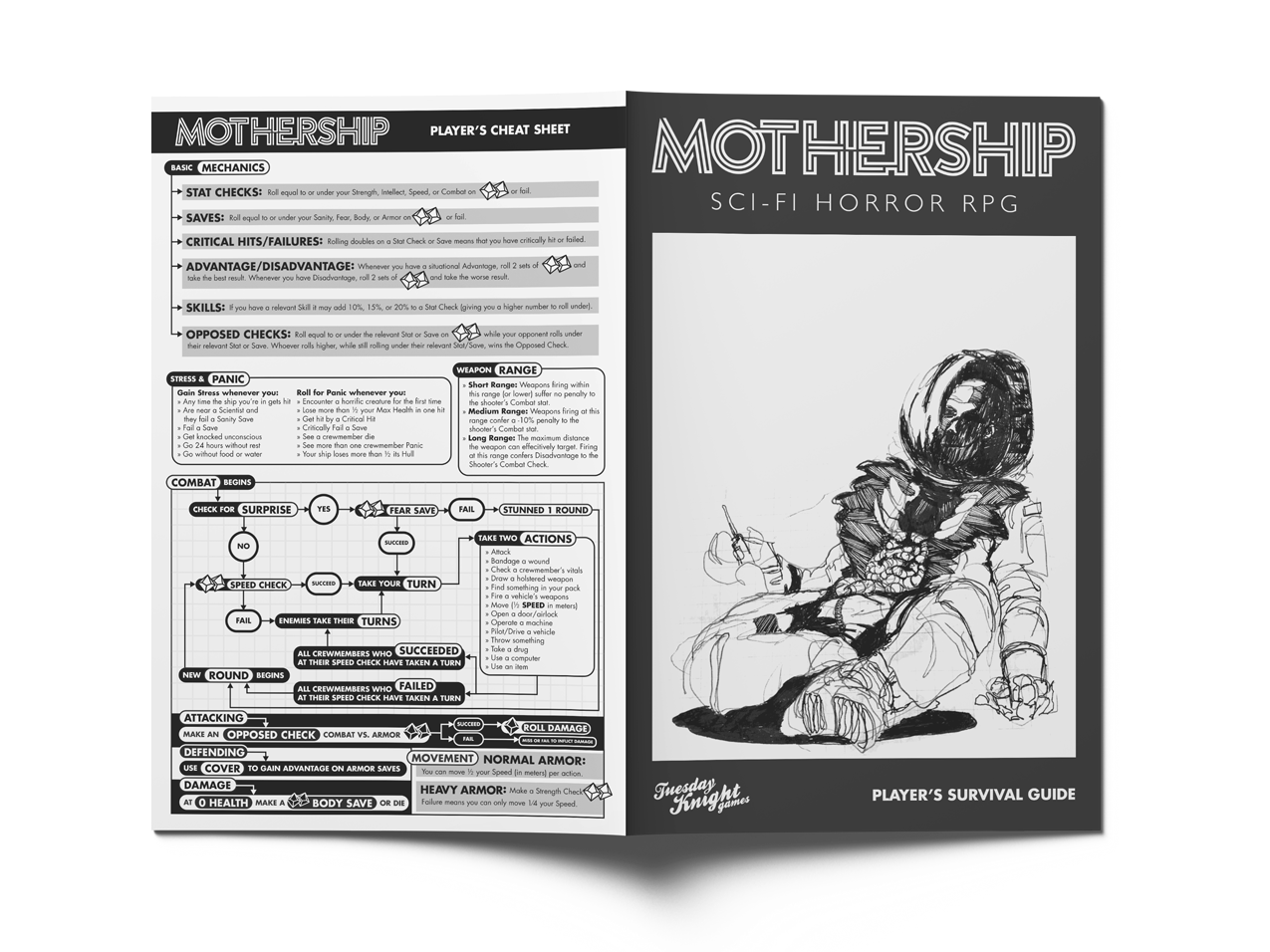Last Updated on November 8, 2023
The huge surge in popularity that Dungeons & Dragons 5e has seen over the last few years has been fantastic.
Because 5e is such a juggernaut, however, it’s sometimes easy to forget that D&D 5e isn’t the beginning or end of this hobby.
There are tons of amazing, well-written, exciting TTRPGs out there, whether you want to explore established universes, new genres, or just different styles of play.
I’ve put together a list of 10 fantastic games that you can pick up cheaply (or for free).
Let’s get started.
1. Lasers and Feelings

- Genre: Sci-Fi
- Complexity: Ultra-Lite
- GM Prep: Medium
- Free Version: Yes
If you want to run a game where learning the rules takes less time than double-knotting a pair of shoes, then Lasers and Feelings is the system for you.
It’s written by John Harper – whose brilliant, much more involved industrial horror heist RPG Blades in the Dark is also well worth checking out.
Lasers and Feelings opens with some very light exposition that puts the general tone somewhere between Star Trek and Star Wars.
It allows the GM to generate the bare bones of an adventure in the same amount of time it takes everyone else to roll their characters.
Every character in Lasers and Feelings is good at one of the game’s two stats:
Lasers: fighting with rayguns, doing sciencey stuff, and flying spaceships
Feelings: conducting tense negotiations, flirting with aliens, and bluffing with space pirates.
A word of warning: This game can be really fun, but it puts a lot of pressure on the GM to improvise a plot, NPCs, and generally keep the gears turning. I’ve run Lasers and Feelings a couple of times, and on both occasions I walked away wishing I’d done more (read: anything at all) to prepare. Rules-Lite does not mean Prep-Lite.
2. Honey Heist
- Genre: Heist/Crime
- Complexity: Ultra-Lite
- GM Prep: Medium
- Free Version: Yes
If you want a game that’s super quick to learn, easy to play, and comes with a rock solid concept baked in, Honey Heist by Grant Howitt is virtually guaranteed to make for a memorable, goofy game night.
In essence, you’re all playing a crew of criminal bears (with roles like the Driver, the Face, and the Muscle as well as different types of bear, like Sun Bear, Grizzly, and Panda – oh, and you get to roll for a random hat as well, which is super important) with two stats: Criminal and Bear.
Your crew is after their biggest score yet: Honey Con.
Seriously, I’ve yet to pitch this game to an RPG group and not be met by wild enthusiasm.
3. Into the Odd
- Genre: Industrial Survival Horror
- Complexity: Light
- GM Prep: Light
- Free Version: Yes
Created by Chris McDowel, Into the Odd is my latest indie role playing game obsession.
Not only does this game hit a setting and tone that’s sadly underrepresented in the scene, but it also contains some fantastic, innovative mechanics.
When you make an ability check, you have to roll a d20 and get equal to or under your stat. Except in combat. In combat, to-hit rolls go out the window; every attack hits automatically.
This completely alters the feel of the game, totally killing the possibility of a boring combat where six different PCs and monsters all stand around whiffing their attacks. It’s frantic and brutal.
4. Mausritter

- Genre: Swords and Whiskers Fantasy
- Complexity: Medium-Light
- GM Prep: Medium
- Free Version: Yes
Loosely based on Into the Odd but with an inventory management system that uses cute little cut out cards from Knave, creating a very tactile little resource management minigame, Mausritter is the perfect RPG for anyone who wants to spend a few hours blissfully immersed in Redwall nostalgia.
It’s a wickedly easy game to pick up with free basic rules that take all of 10 minutes to learn.
Fair warning: This is definitely not a game for people who want to have a few hours of wholesome, mousy fun.
Mausritter can be a punishing, deadly experience, and it definitely rewards players who run away from the giant, furry killing machines (cats are this game’s analogue for dragons) rather than toward them.
That being said, it definitely rewards out of the box thinking, and its system for magic items and spells (especially the ways in which you recharge your spell stones) is wonderful.
5. Wanderhome

- Genre: Pastoral Fantasy
- Complexity: Medium
- GM Prep: None
- Free Version: No
- Paid Version: $24.99 (pdf)
If the violent reality of being whiskered adventurers isn’t for you, how about something that feels more inspired by Wind in the Willows and Winnie the Pooh?
Wanderhome, by Jay Dragon, is a dice-less, GM-less storytelling game about a small band of animal-folk making their way through a peaceful, pastoral world.
It’s the perfect game for players who love to roleplay above all else. There’s no fighting. No monsters to slay. Just the next town and their charming, small-stakes problems.
There are no dice. Instead, players make Moves, with weak moves that put you in a tricky spot gaining you tokens to spend on stronger moves that hopefully let you make things go your way down the line.
Everything’s very narratively focused and freeform – perhaps best exemplified by the fact there is no GM. Instead, everyone works together to create a story they like.
6. Mork Borg
- Genre: Doom Metal Old School Dungeon Crawling
- Complexity: Light
- GM Prep: Light
- Free Version: No
- Paid Version: $14.99 (pdf) but you should totally go buy the hard copy – it’s so pretttyyyyy
If a doom metal album had a baby with a big bag of obsidian knives, you’d get Mork Borg. This hyper-violent, visually striking game pitches itself as “rules-lite, heavy everything else” and delivers on that promise with gusto.
Character creation is robust, quick, and will probably leave you naked and afraid, clutching nothing but a single hit point, a rusty knife, and a very small, very angry dog.
Gameplay is simple and intuitive, and the sample dungeon (Rotblack Sludge) included with the core book is a great introduction to just how cheap life in Mork Borg can be. Mork Borg is also one of the best-supported indie games in terms of free additional resources, adventures, and online tools on the market.
7. Mothership

- Genre: Sci-Fi Horror
- Complexity: Medium
- GM Prep: Medium
- Free Version: Yes
In space, no one can hear you roll for initiative.
Drawing ostensibly from the cold, gritty Alien universe, Mothership by Tuesday Knight Games is replete with deep space horror, callous megacorps, and nasty things lurking in the dark.
It’s also full of rogue AIs, gibbering cultists, and, uh, yeah I think space ghosts?
Mothership has a pretty robust ruleset and the d100 roll-under core mechanic found in games like Call of Cthulhu. I would totally recommend picking up one of the start adventures (which are presented in really scannable, short zine formats), like A Pound of Flesh or Dead Planet, to start things off with a bang.
8. Cats Of Catthulhu

- Genre: Eldritch Paw-ror
- Complexity: Light
- GM Prep: Medium
- Free Version: No
- Paid Version: $4.95 (pdf)
Want to dip your paws into the eldritch void that exists beyond the mortal world? Want to also be a cat?
Cats Of Catthulhu is a charming little game that sets its players (and the GM, who’s called the Cat-Herder) on a collision course with the dread machinations of the elder gods.
It’s great for investigative horror, mixed in with the comedy of watching all your friends roleplay as cats. Personally, I would keep the skin of this game and steal the mechanics from Into the Odd.
9. Goblin Quest

- Genre: Mayhem?
- Complexity: Medium
- GM Prep: None
- Free Version: No
- Paid Version: $15.00 (pdf)
Another Grant Howitt joint, Goblin Quest is a GM-less disaster factory that sets you and your buddies up as the various members (plus backups because, boy howdy, you’re gonna need them) of a tribe of goblins.
There are no grand stakes here. If there were, it wouldn’t matter because, well, goblins are dumb and bad at stuff, and they die a lot.
If you want to spend a riotous couple of hours trying frantically to make an omelet, during which time three goblins get pecked to death by a chicken and another one gets set on fire, this is definitely the game for you.
10. The Mecha Hack
- Genre: Sci-Fi/Gundam
- Complexity: Light
- GM Prep: Medium
- Free Version: No
- Paid Version: $6.95 (pdf)
If you’re looking for a gritty, gritty, hard sci-fi mecha experience, don’t play this game.
Play Lancer by Massif Press instead for the most in depth, beautifully tactical representation of big metal boys beating the crap out of each other (with a gigantic, rich setting that’s to die for).
If you’re not willing to subject yourself to the 400+ page grimoire of rules so complex they’d make D&D 4e blush, then the Mecha Hack is going to be more your speed.
The Mecha Hack is a great way to get a gundam- or Neon Genesis-inspired game up and running in no time. Also, if you want to cut down on GM prep, there’s a recently released supplement that’s packed with pre-written missions that make running this game out of the box into a very easy experience.
I played my first tabletop RPG (Pathfinder 1e, specifically) in college. I rocked up late to the first session with an unread rulebook and a human bard called Nick Jugger. It was a rocky start but I had a blast and now, the better part of a decade later, I play, write, and write about tabletop RPGs (mostly 5e, but also PBtA, Forged in the Dark and OSR) games for a living, which is wild.
